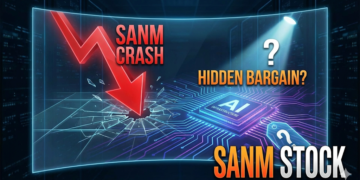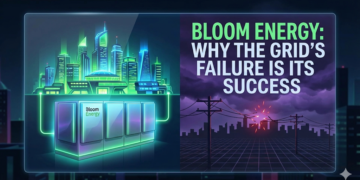QuantumScape Corporation (NYSE:QS) is a trailblazing energy storage company at the forefront of next-generation battery innovation. Founded in 2010 by Jagdeep Singh, Tim Holme, and Stanford professor Fritz Prinz, QuantumScape was born from a bold idea: to overcome the limitations of conventional lithium-ion batteries by developing a solid-state, lithium-metal alternative. The company originated from research conducted at Stanford University and was incubated within the university’s Precourt Institute for Energy, where it focused on solving the dendrite and safety challenges that hindered the commercial viability of lithium-metal battery technology.
Within just two years of its founding, QuantumScape secured a key partnership with Volkswagen Group. This collaboration grew into one of the most strategic and long-standing alliances in the EV battery industry. Volkswagen not only invested over $300 million in QuantumScape, but also entered into a licensing agreement allowing it to scale QuantumScape’s battery tech to as much as 80 GWh per year through its battery subsidiary PowerCo. Volkswagen’s support has helped validate QuantumScape’s core technology and de-risk its manufacturing roadmap, making it one of the most well-capitalized and OEM-integrated battery startups in the world.
QuantumScape made its public debut in November 2020 via a reverse merger with Kensington Capital Acquisition Corp., a special-purpose acquisition company (SPAC). The transaction raised over $700 million in gross proceeds and brought the company to the New York Stock Exchange under the ticker symbol QS. The listing not only marked a significant milestone in the company’s history but also positioned it as one of the earliest solid-state battery developers to reach public market investors, igniting widespread interest in the future of energy storage.
The company’s proprietary battery architecture is uniquely “anode-free,” using lithium-metal as the anode only once the cell is charged. This design, combined with its solid ceramic separator, enables superior energy density, faster charge times, and a safer operating profile compared to legacy lithium-ion technologies. Independent testing and internal results have shown QuantumScape’s cells can deliver up to 1,000 cycles with over 95% capacity retention and ultra-fast 15-minute charging from 10% to 80%.
QuantumScape’s pilot manufacturing facility in San Jose, California—referred to as QS-0—is now producing prototype cells, with its next-generation high-throughput Cobra separator line recently entering baseline production. This marks a crucial milestone toward scaling its manufacturing capability, reducing equipment footprint, and enabling continuous-flow production suited for gigafactory deployment. The Cobra platform is now set to become the company’s foundation for commercial battery production, driving forward its 2025–2026 commercialization timeline.
With over 600 patents and patent applications, a deep bench of engineering talent, strategic partnerships, and a robust cash position expected to fund operations through at least 2028, QuantumScape is well-positioned to be the definitive leader in solid-state battery innovation. Its technology promises to usher in a new era of safer, longer-range, faster-charging electric vehicles—making the company a compelling long-term investment opportunity at the intersection of clean energy and mobility.
Cobra Separator Reaches Baseline Production—A Breakthrough Moment
On June 24, 2025, QuantumScape announced that its next-generation Cobra separator process is now fully integrated into baseline production, replacing the earlier Raptor line and instantly boosting manufacturing speed while shrinking the footprint of key equipment. Chief Executive Officer Dr. Siva Sivaram praised the internal engineering team for “significantly improving throughput and shrinking the equipment footprint,” calling Cobra “a powerful path forward for commercializing our next-generation battery technology.” The company emphasized that Cobra will underpin gigawatt-scale production and accelerate the transition from prototype B0 cells to customer-ready B1 samples.
Market Reaction Underscores Investor Confidence
The production milestone ignited a powerful after-hours rally: QuantumScape shares surged roughly thirty-five percent and briefly changed hands above $5.70, making QS one of the day’s most-watched tickers across retail and institutional platforms. Trading volume in extended hours jumped into eight-figure territory as momentum traders and long-term believers alike responded to the tangible progress toward mass manufacturing.
Why Cobra Matters to QuantumScape’s Commercialization Timeline
Raptor, the outgoing separator process, already gave QuantumScape lab-scale stability. Cobra adds continuous-flow automation that slashes thermal-process time and allows multiple modules to run in parallel, paving the way for higher yield and lower cost per square meter of separator. With Cobra set as the baseline, future iterations—internally dubbed Cobra +—are expected to compress cycle times further and unlock B1 cell volumes large enough for automotive homologation. Management projects that these enhancements will feed directly into the Volkswagen PowerCo joint-venture plant slated to begin equipment installation in late 2026.

CHECK THIS OUT: MicroVision (MVIS): A Top Pick in Autonomous Tech Stocks and Innoviz (INVZ) May Be Severely Undervalued — Investors Shouldn’t Ignore This Stock.
Anode-Free Lithium-Metal Architecture Delivers Energy Density and Safety Advantages
QuantumScape’s cell architecture eliminates the conventional graphite anode and plates pure lithium metal in situ during charging. Paired with its proprietary flexible ceramic separator, the design achieves gravimetric energy densities around three hundred watt-hours per kilogram and volumetric densities approaching one thousand watt-hours per liter—levels inaccessible to today’s liquid-electrolyte lithium-ion packs. Third-party tests conducted by Volkswagen’s battery subsidiary have shown capacity retention of roughly ninety-five percent after one thousand full-depth cycles, alongside the ability to recharge from ten to eighty percent in about fifteen minutes while remaining non-combustible under nail-penetration and thermal-runaway abuse tests.
Strategic Alliance with Volkswagen PowerCo Provides a Capital-Light Route to Gigawatt Production
Volkswagen’s PowerCo holds a long-term license to build up to forty gigawatt hours of QuantumScape cells annually—expandable to eighty gigawatt hours—under a structure that sends royalty streams back to QS and leaves the heavy factory capex on the automaker’s balance sheet. In 2024 PowerCo advanced a $130 million royalty prepayment that extended QuantumScape’s cash runway into the second half of 2028. Analysts view the licensing blueprint as repeatable with additional original-equipment manufacturers once B-sample validation is complete.
Financial Fortitude and Valuation Potential
As of the first quarter QuantumScape reported approximately $860 million in liquidity, enough to fund planned operations, B1 scale-up, and early royalty revenues without a dilutive capital raise. Several recent valuation models published on Seeking Alpha and The Motley Fool suggest that even modest adoption—five percent solid-state penetration of global EV demand by 2032—could translate into multi-billion-dollar annual royalty streams for QS, supporting gross margins north of seventy percent and implying double-digit annualized total returns from current share-price levels.
How New Investors Can Catch the Ride
QuantumScape trades on the New York Stock Exchange under the symbol QS, and most online brokerages now offer fractional-share capability, allowing newcomers to initiate a position with less than the cost of a single full share. More sophisticated traders sometimes express short-term views with options, such as purchasing puts for downside protection or selling covered calls against an existing long position, although these strategies require approval for options and carry added risk.
Macro Tailwinds Accelerate Solid-State Adoption
Global electric-vehicle deliveries surpassed fourteen million units in 2024 and are forecast to top twenty-five million by 2028, yet range anxiety, fast-charge limitations, and fire-safety concerns remain front-of-mind for consumers and fleet operators. Solid-state batteries address all three pain points simultaneously. Few contenders possess the intellectual property depth or manufacturing road map that QuantumScape now demonstrates; its nearest rivals include Toyota, Solid Power, and Factorial, but none have publicly disclosed a gigawatt-capacity ceramic separator line in baseline operation.
Key Catalysts on the Horizon
Investors should monitor three milestones over the next eighteen months. First, QuantumScape plans to deliver its B1 multi-layer cells to automotive partners for in-vehicle testing. Second, Volkswagen’s Salzgitter facility will finalize the design freeze for the first Cobra-based separator module. Third, the company expects to announce at least one additional licensing partner outside the Volkswagen ecosystem, broadening its royalty base and validating its capital-light model. Timely execution across these fronts would reinforce the recent share-price momentum and could spark upward earnings-estimate revisions.
Risks to the Thesis and Mitigating Factors
Scaling any first-of-its-kind manufacturing process invites technical hiccups, yield variability, and supply-chain pressure for key ceramic powders. Additionally, aggressive competitors may claim incremental breakthroughs that erode QuantumScape’s perceived technology lead. Finally, macroeconomic slowdowns or lower-than-expected EV adoption could push back licensing revenue. Counterbalancing these risks are QuantumScape’s sizable cash buffer, its exclusive joint-development agreements, and the modular upgrade path that Cobra brings to separator manufacturing.
Conclusion: A Company on the Brink of Commercial Reality
QuantumScape has long been a story stock distinguished by bold promises and brilliant laboratory data. The successful integration of Cobra into baseline production marks the moment when story meets factory floor. With energy-density leadership, a capital-light licensing strategy anchored by Volkswagen, and a cash runway that extends well past first commercial shipments, QuantumScape is increasingly positioned as the pure-play proxy for the solid-state battery revolution. The next chapter will hinge on flawless B1 execution, but investors now have tangible evidence that the company’s technology belongs not just in research papers, but in real-world gigafactories and, soon, under the floorboards of mainstream electric vehicles.
READ ALSO: Golden Matrix Group (GMGI): The Explosive iGaming Stock You’re Probably Sleeping On and This AI Stock Powers Millions of Conversations Daily—LivePerson (LPSN) Deserves a Spot on Your Watchlist.






